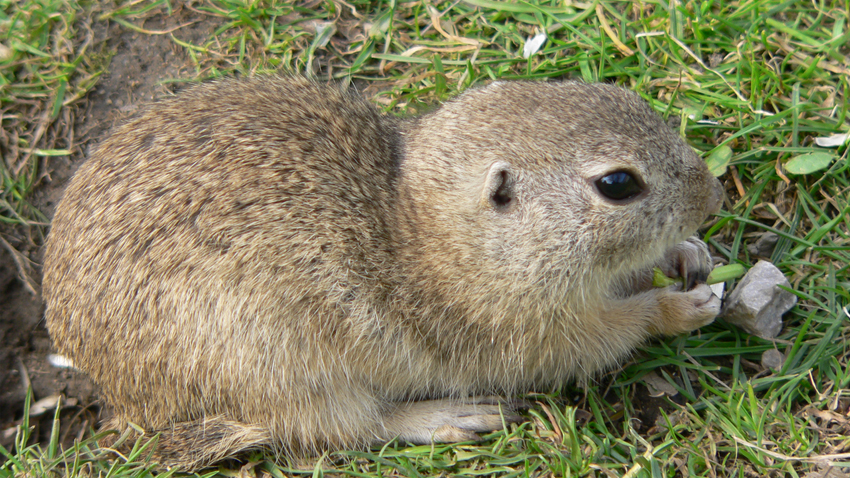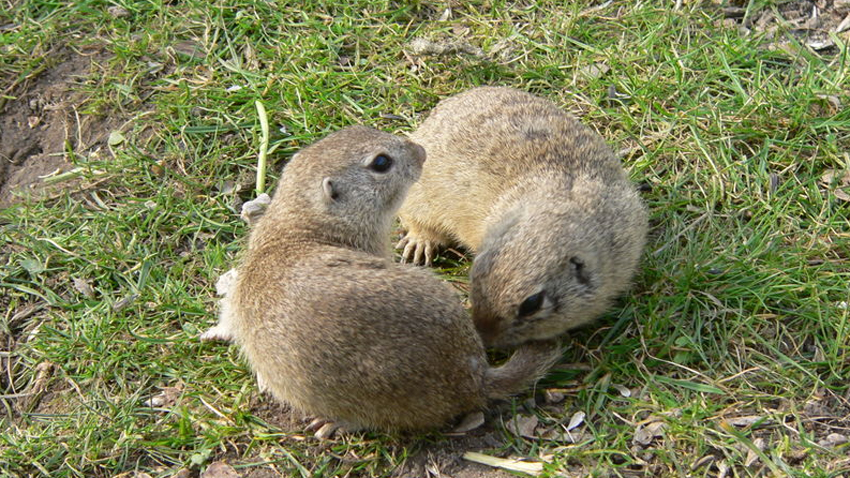The European ground squirrel (Spermophilus citellus) is a cute animal that looks a lot like the American marmot and is one of the most important species for conservation in Europe. It is found only in the eastern parts of the continent. The species is now extinct in Germany and highly endangered in the Czech Republic. It can still be seen in Hungary, Romania, Bulgaria, and Greece and partly in the European territory of Turkey. According to a recent genetic study conducted by an international team, including scientists from Bulgaria, the Czech Republic, Germany and Turkey, the European ground squirrel is actually Bulgarian in origin, i.e. it emerged on these lands more than one million years ago. Its habitats are priorities for conservation in the Natura 2000 European ecological network.
The European ground squirrel is one of two species of ground squirrels that can be found on the continent, Associate Professor Jordan Koshev from the Institute of Biodiversity and Ecosystem Research at the Bulgarian Academy of Sciences says.

"One is the speckled ground squirrel, which is found to the north in Poland and Russia and it is actually a foreigner. The other one is the European ground squirrel, which has a limited distribution almost exclusively in the EU. Therefore, it appears endemic to the Union and its protection is of great importance for Europe."
So it turns out that the European ground squirrel is Bulgarian in origin. Clues that its roots lie in the distant history of our lands have emerged during paleontological excavations.
"We have discovered fossils of the species in Bulgarian caves and thought the animal probably originates from this territory,” the scientist says. “We managed to confirm this by using new methods of genetic study and learned about its history from the times when the species originated to its expansion on the continent. We proved that the species originated from these lands, because the highest genetic diversity is seen here. In Bulgaria 5 of the 7 known genetic lines of the species have been discovered. That is why Bulgaria is so important for the conservation of the European ground squirrel."
An international scientific team reached these conclusions after studying the genes of 915 ground squirrels from 11 countries in Central and Eastern Europe.
But why is it so important to study the ground squirrel?
"The souslik is very important animal for ecosystems,” says Mr. Koshev. “It is considered a key species because it creates a favorable habitat for other species through digging holes. At the same time it is food for many predators like falcons, eagles, etc. A number of species use the ground squirrel for food and their populations decline with the decline of the number of sousliks.”

What is the situation in the ecosystems in western Europe where the European ground squirrel never existed?
"Widespread there are a species of underground rabbits. They live in holes and go out to the surface to feed. In Western Europe the rabbit is the favorite food for predators, which otherwise prefer the souslik in Bulgaria. This type of wild rabbit is unknown in Bulgaria.”
The results of the study will be used to better work on the conservation of the European ground squirrel in the areas where it still occurs. The aim is also to help it return to places where it cannot be seen anymore. Bulgaria has already made successful attempts for the reintroduction of the species in some natural parks. A study will also identify how climate changes affect the ground squirrel and its distribution in Europe. This way more effective measures for its protection can be taken.
English: Alexander Markov
"Every day, we should think about peace and the messages that politicians send,” journalist Tsvetana Paskaleva, who has been living in Armenia for 30 years, says. "The situation around us and in neighbouring countries is unstable and..
Conservationists from Bulgaria Bird Walks are organising a birdwatching walk in Varna today to observe water fowl and forest birds. Two walks are planned in the Sea Garden at 9.00 and 13.00. There will be similar outings every month in the city, said..
The greater flamingo was considered an exotic species for Bulgaria, but for several years, entire colonies have chosen the lakes around Burgas as their residence. Currently, more than 450 flamingos inhabit the Burgas wetlands ...
Dear friends, we are happy to announce that the Bulgarian National Radio’s QSL cards for 2025 are now available. The two series – one with 6 postcards..
Babinden, or Midwives' Day, was once again this year celebrated across the country with songs, dances and ritual re-enactments. The day of midwifery was..
Bulgaria ranks last among EU Member States in terms of life satisfaction. This is according to Eurostat data for 2023 published today . With an average..

+359 2 9336 661
